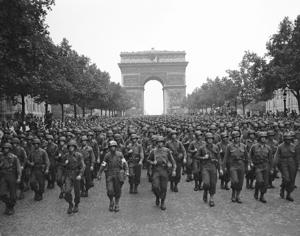I grew up knowing little of my uncle’s World War II experiences. In his bedroom, I recall a shadow box of medals and insignia. They were all Greek to me.
He and my aunt were childless. When she, too, passed, I was in my 20s. I found in their basement a trunk of letters he wrote to her from the European Theater: England, France, Belgium and, finally, Germany.

There were hundreds of Victory envelopes, tissue-thin correspondence stamped “passed” by an Army censor and flown home on a 3-cent purple Victory stamp. Only then, after poring through his contemporaneous writing, did I begin to appreciate a soldier’s sacrifices and experiences: The sounds of V-1 missiles (called doodlebugs) passing overhead. The horrors inside a concentration camp.
The relief of surviving a bombing raid. This past Christmas, while three generations of us were assembled in the den, my wife pulled out a black-and-white photo of my uncle in uniform. And I told the grandchildren about him.
That’s what it’s going to take to keep meaningful memories of our vets alive. WILL FELTS James Island Most Post and Courier readers are aware of a growing polycrisis involving pollution , flooding, climate change, biodiversity loss and related threats. They sometimes ask: “What can I do?” There are many answers, but I suggest one thing many of us can do that, when combined with similar efforts, would have a huge impact.
If people have some control over any property, such as a yard or common area, consider r.
















